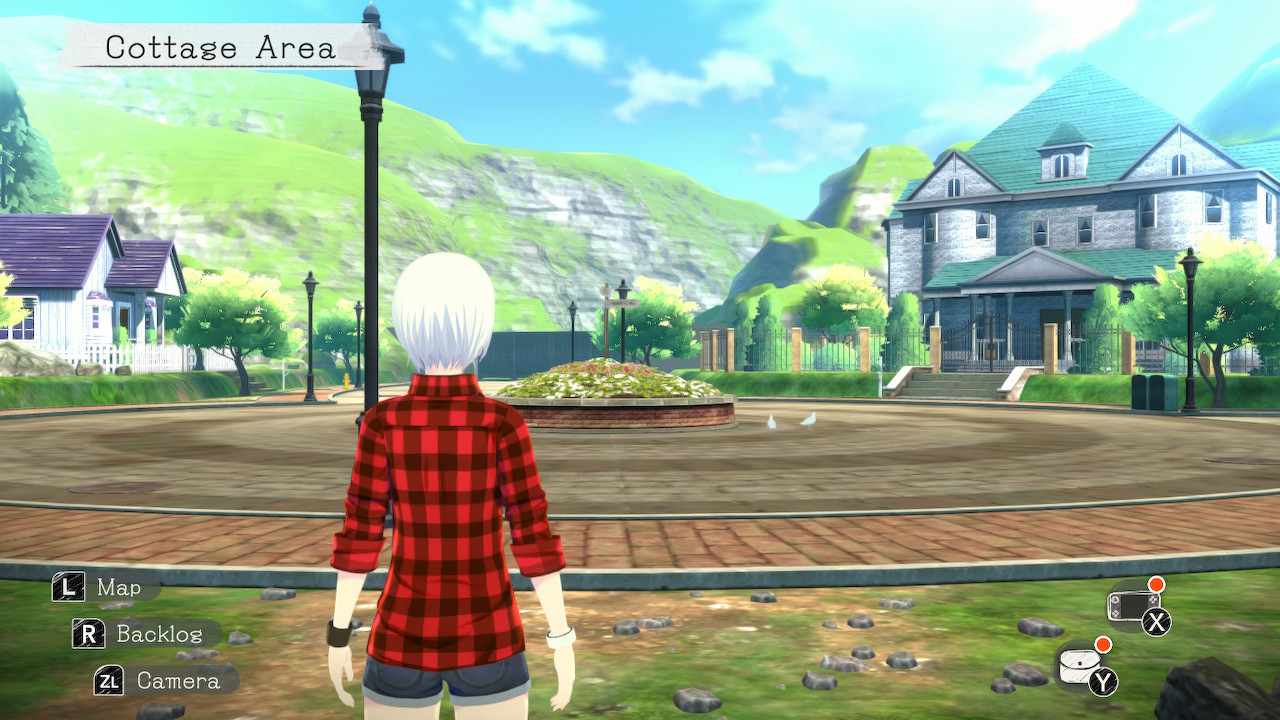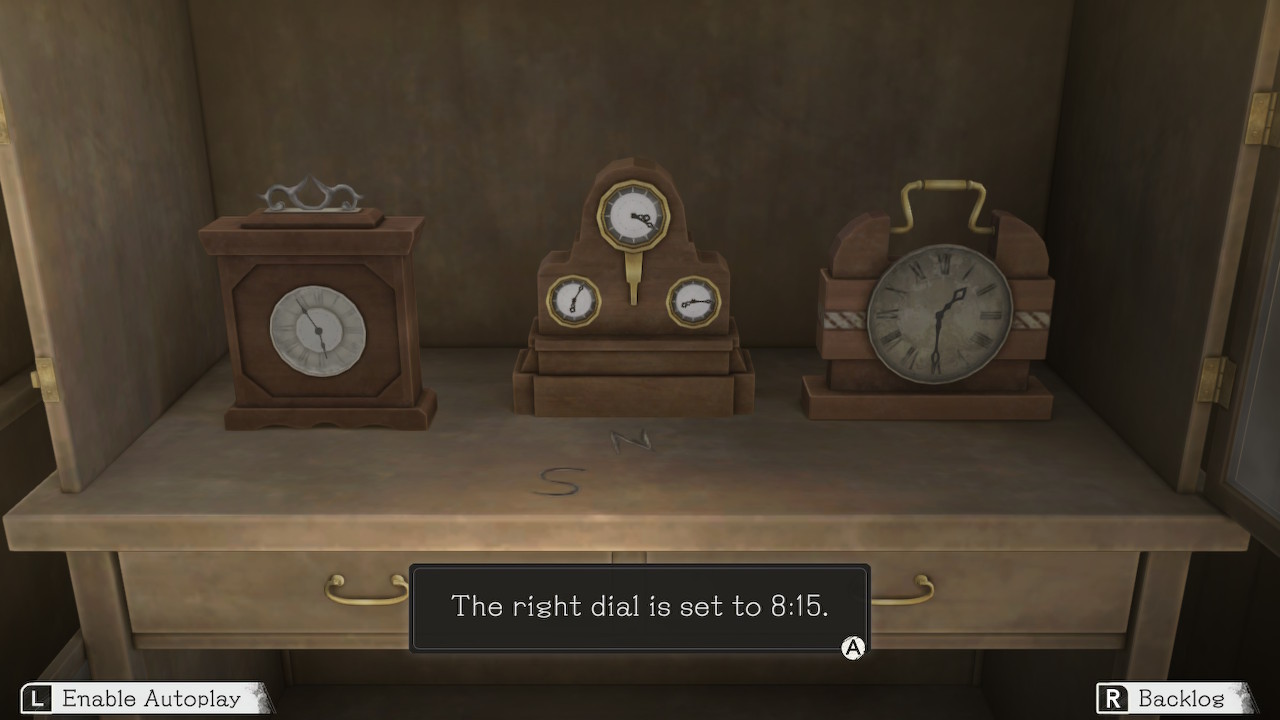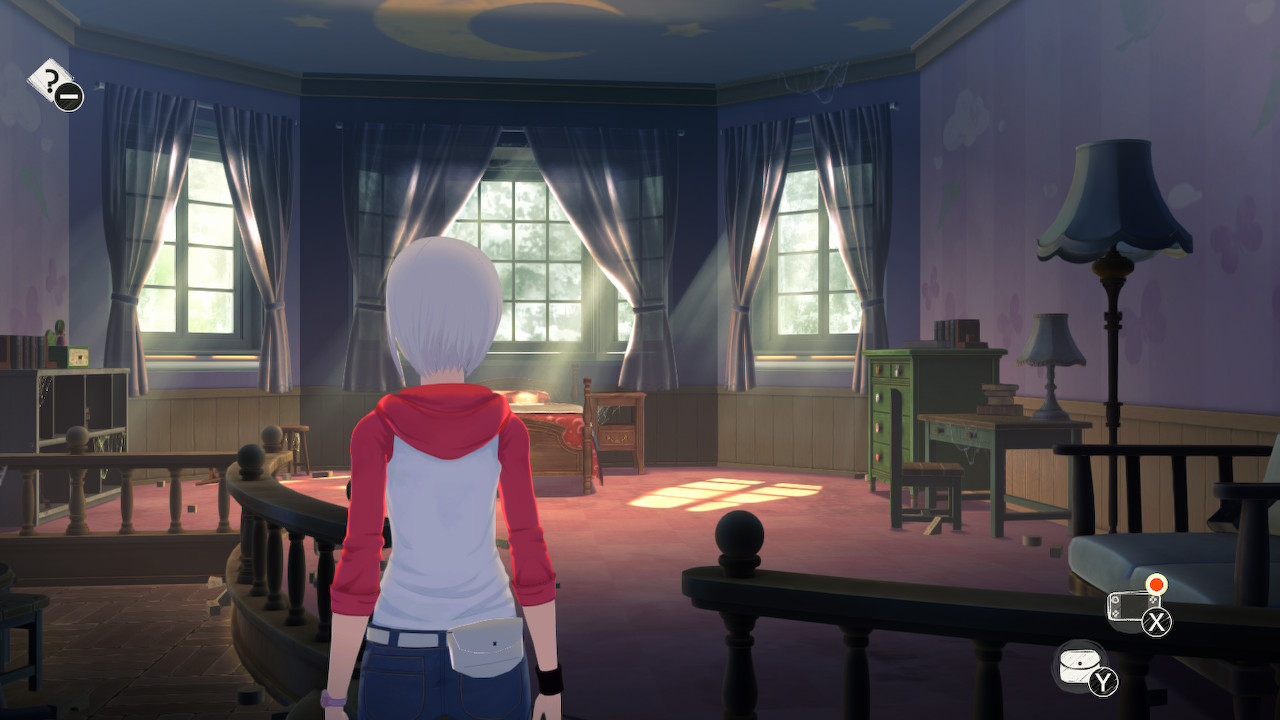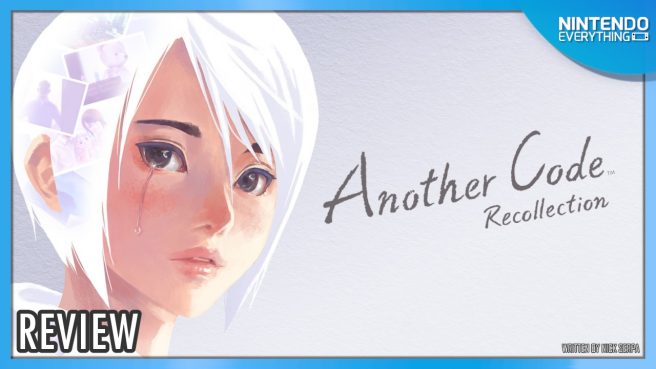[Review] Another Code: Recollection
System: Switch
Release date: January 19, 2024
Developer: Arc System Works / Nintendo
Publisher: Nintendo
It’s really a bit remarkable that, of all the long-dormant franchises Nintendo could have chosen to resurrect next, it was Another Code that they decided to give another chance. I’m totally here for it, both as a fan of narrative-driven adventure games, and as an advocate for the preservation and accessibility of older titles; I’m just surprised that it actually happened. Another Code: Recollection is a full remake of the 2005 DS game Another Code: Two Memories, as well as its Wii sequel, Another Code R: Journey into Lost Memories – the latter which never released in North America. While these puzzle-tinted mystery games have always been well-regarded by fans for their compelling premises and overall atmosphere, they never sold particularly well globally and generally received mixed reviews from critics; furthermore, the original development studio no longer exists, and both games were built around hardware features unique to their original platforms. Well, against all odds, we now have a reimagined collection of both titles sporting improved visuals and presentation, and even some narrative and gameplay changes. While I ultimately enjoyed my time getting to know the game’s charming protagonist and unraveling a moderately captivating mystery, Another Code: Recollection’s toothless writing and shallow moment-to-moment gameplay makes it a slightly niche recommendation.
Ashley Mizuki Robbins isn’t your typical video game protagonist, in that she’s very much just an average teenage girl without any special abilities (well, outside of her constant childhood flashbacks and some cool tech she carries around). Another Code: Recollection is first and foremost about the relationship dynamics between strained and broken family bonds, and specifically, Ashley’s journey to better understand her own family. She’s dealing with a fair bit of trauma at the start of her story – her mother died under mysterious circumstances when she was only three years old, and her father Richard has been missing for most of her life. She’s surprised and confused when, after living with her aunt for most of her life, she suddenly receives a birthday card and a strange device in the mail from someone claiming to be her dad, who is apparently living on an island off the coast of Washington. Naturally, Ashley and her aunt Jessica decide to go there to meet him – but shortly after their arrival, Jessica suddenly disappears, leaving Ashley alone. She sets off to uncover the mystery of whether or not her dad is truly alive – and if so, what would have brought him to the ominously named Blood Edward Island over a decade ago.

While Another Code Recollection is technically a remake of two games, for this package they’ve both been reworked into a singular narrative. Even if you already played Two Memories on the DS back in the day, there’s no way to simply jump right into the remake of the sequel, as Another Code Recollection treats both games as simply two arcs of the same story, barring a title screen between each halve. As someone who never played the originals upon release, I quite enjoyed this format, but I could see this structure frustrating returning fans. That said, make no mistake: an incredible amount of care has been given in attempting to modernize these games. Two Memories was originally played from a top-down perspective on the DS, and its sequel on the Wii was an interesting combination of point-and-click gameplay and side-scrolling navigation. Now, the settings of both games have been reworked into fully-explorable 3D spaces, with more traditional dual-stick controls that feel intuitive. (Just be sure to crank up the sensitivity in the settings before you start, because by default the camera moves abysmally slowly.)
The first chunk of Another Code: Recollection is entirely set on that island; I spent about eight hours working through the events of the Two Memories storyline, and about ten hours in the reimagining of Journey Into Lost Memories. That second narrative arc picks up two years later; Ashley is now sixteen years old, and is traveling solo to a picturesque town along the shores of Lake Juliet. It’s a sleepy place that’s also a failed tourism destination, and of its handful of permanent residents, almost all of them have some connection with JC Valley, a nearby research institute shrouded in secrecy. Discussing Ashley’s impetus for visiting Lake Juliet would spoil the events of her earlier adventure, but broadly speaking it’s a much grander-feeling tale with higher stakes and more moving parts, in terms of its narrative.

The locales of Blood Edward Island and Lake Juliet as presented in Another Code: Recollection are undoubtedly now in their definitive form, and have been reimagined and realized in ways that wouldn’t have been possible on the DS and Wii. Don’t expect a graphical showcase – there are plenty of blurry textures and low-poly geometry that will remind you that this is likely not a big-budget project – but it’s still a world that’s rendered at a high enough quality that it feels fairly convincing to navigate. While the estate that Ashley spends her time at during the Two Memories arc isn’t a huge place to explore, its various bedrooms and parlors are convincing, cluttered with dusty books and broken floorboards that threaten to give way as Ashley walks across them. The place is bathed in a soft light that gently highlights Ashley’s face as she passes by a window, and each new space is fun to poke around in. Conversely, the Lake Juliet map in the Journey Into Lost Memories arc is substantially larger – a residential area, a campsite, a few shops and an abandoned clock tower are just a few of the locations Ashley will visit as part of her investigation, and I really enjoyed gradually exploring more of the town as new narrative threads began to unravel. That said, don’t expect the sort of freeform exploration that the open map design would suggest. Another Code: Recollection keeps the player on a pretty tight leash, and sometimes walking out of a building means you won’t be able to explore it again, simply because there’s no narrative reason for Ashley to go back there.
Generally speaking, Another Code: Recollection’s gameplay is dictated solely by its narrative. While the game certainly has puzzles, I wouldn’t call it a “puzzle game” as they feel like a relatively small portion of the gameplay, and only generally come up when there’s a narrative reason for them to be there. The Two Memories arc feels more puzzle-heavy than the Journey Into Lost Memories arc, mostly because the abandoned mansion that Ashley finds herself contains many locked doors adorned with vague symbolism that ties into the history of the place. To find more keys to progress deeper into the crumbling residence, Ashley will solve some one-off puzzles; one of them, for example, involves figuring out which combination of notes to play on a piano to open its secret compartment. Another puzzle temporarily shifts the game into a first-person perspective, as Ashley wanders through a dark library, needing to methodically place a limited number of candles to illuminate her path forward. While some of the puzzles have some clever ideas, they’re almost mindlessly simple to complete, and that’s without any reliance on the in-game hint system. It seems like many of the puzzles that relied on the original DS hardware have been stripped out entirely from this remake, and this could very well be part of the reason why the ones that remain feel a little average. But as it stands, as long as you’re paying attention to Ashley’s dialogue and thoughts, you’ll likely have no trouble completing them unless this is your first experience with this type of game.

I was surprised to find that the Journey Into Lost Memories arc strips back the puzzles even more. There are only a handful of them, and while they tie in nicely to the setting, about half of them are little more that quick-time events where you have to quickly hit a series of buttons. This second arc is much more focused on its larger cast of characters, all of whom find their personal lives intersecting with Ashley’s investigation of Lake Juliet in various ways. Outside of the 25 percent of the time that you’re solving a puzzle, the rest of Journey Into Lost Memories is spent viewing cutscenes or visual novel-style dialogue scenes, and/or walking through the environment to get to the next of those story scenes. While I don’t have a problem with this format inherently, I do think some players will be surprised with how little there is to actually do in Another Code: Recollection. There are some notes hidden around the game world that Ashley can find and scan with a device she uses called the DAS, but there’s only a handful of them and they’re not really all that tough to find.
The good news is that the core mystery that drives the plot is compelling, albeit not revolutionary. What starts as a plot about trying to remember the truth of a traumatic moment in Ashley’s life eventually evolves into a story about the concept of memory itself; the first arc’s science-fiction undertones ramp up considerably in the second arc, in a way that feels grounded in the setting even when things get a little weird. It works mostly because Ashley is a likable character, whose anxiety and life experiences are easy to sympathize with – almost everyone can relate to experiencing loss at some point, and because Ashley is so patient and kindhearted, she’s the kind of character the player wants to root for. She’s resilient, but not to the point where it feels like she’s wearing plot armor – more importantly, she’s in touch with her emotions, which are the driving action for everything she does. Ashley’s characterization helps ground her tale in reality even as the stakes rise.

This is remarkable considering how one-note Another Code: Recollection’s writing is. This may see a bit harsh, but I liked Ashley the most when she was exploring by herself, because the second she has to interact with other characters things tend to go downhill quickly. More often than not, the dialogue simply feels artificial. Almost every other character in the game falls into a basic stereotype: the high-school girl who is bratty and rude because she’s rich, the cartoonishly-bad evil scientist, the lazy rockstar who just hates work. There’s just no depth to any of them, no real meaningful layer to grab onto that makes them people you want to care about. Sometimes, stories about teenagers tend to get a bit campy, and that’s fine, but games like Life Is Strange do a better job balancing the schlock with the tension of the story. It’s also just a bit strange that almost every teen or child character in the game has some kind of longstanding family issue or trauma – it makes sense for Ashley, but towards the end of my playthrough it was getting to be a bit overbearing.
And for as much as Ashley is the glue that ties these games together, even she has her moments that made roll my eyes. I’ll never forget when, in the Two Memories arc, Ashley looked at a gravestone and said, “I wonder when this person died” despite the fact that the dates were clearly written write in front of her. Or that other time when she looked at a picture with her mom and dad and said something along the lines of “that baby in the picture must be me!” It’s a little silly, it happens more often than it should, and it’s not a great fit for a game that wants to have all these lofty narrative ambitions. Some other elements of the story just felt a little tacked on for me – in the Two Memories arc, Ashley spends a lot of time accompanied by a friendly ghost named D, and while his presence makes sense in the context of the plot, his story just wasn’t compelling to me. Likewise, the reveal of Another Code: Recollection’s antagonists and their motives is meant to be a twist when it arises (twice!), but each reveal is so utterly predictable that it feels a bit meaningless.
All my narrative gripes aside – I still enjoyed my time with Another Code: Recollection, in the same way that I occasionally enjoy revisiting some of the young adult novels I read when I was in high school. Once I embraced that, okay, this tale is going to be just a little more inane than most of the media I enjoy nowadays, I began having more fun. The art direction goes a long way toward tinting Another Code: Recollection with that added dose of charm; the crisply-rendered anime-styled character models really pop against the softer pastel colors of the world, selling the idea that Ashley’s memories are at the forefront of her mind while she’s exploring this dreamlike world. Sure, her exaggerated animations are goofy, but they also add levity to scenes that otherwise might be a bit too tense for Recollection’s narrative goals. Likewise, the soundtrack is very Nancy Drew, evoking just the right amount of mysterious overtones without venturing into grimdark territory. There are some truly beautiful tracks underpinning both story scenes and navigation, including some I would totally listen to outside the game itself (that is, if Nintendo could ever be bothered to upload their music to Spotify – but I digress.)
The Verdict

Another Code: Recollection feels like a special experience for fans of narrative-driven adventures, and while its writing can often feel too simple and juvenile for its own good, it ultimately manages to use its charm to help invest the player in Ashley’s personal life and her desire to find the truth. Some interesting science-fiction elements add exciting wrinkles to the narrative, and both arcs of the story have been reworked to seamlessly tie together into one well-rounded story. While the tight focus on narrative above all else means that puzzles and exploration feel like more of an afterthought than some players might prefer, ultimately the tight narrative pacing and delightful presentation help create a world that feels tangible and interesting. Recommended for those looking for a casual slice-of-life mystery that will definitely make you smile, even if it won’t blow your mind.
Another Code: Recolection copy provided by the publisher for the purposes of this review.
